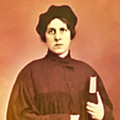Career
In her first career, Stanton was a psychotherapist. [8] She specialized in grief counseling, and was asked to speak to people in Columbine after the 1999 high school massacre. [10] Before preparing for the rabbinate, she sought to become a cantor, but heard that Jewish leadership positions were not available to women. [11] When she finally saw a female cantor, she decided to pursue the studies necessary to become a rabbi. [11]
Stanton graduated from Hebrew Union College-Jewish Institute of Religion, a Reform Jewish seminary. [6] She has said that she is not concerned with being the first Black woman to become a rabbi, "I try not to focus on being the first. I focus on being the best—the best human being, the best rabbi I can be." [12] "If I were the 50,000th, I'd still be doing what I do.... Me being first was just the luck of the draw." [13]
In August 2009, Stanton became the rabbi of Congregation Bayt Shalom, a small majority-white synagogue in Greenville, North Carolina, [5] making her the first African American rabbi to lead a majority-white congregation. [3] The congregation's president said that the fact that Stanton is African-American and a woman had nothing to do with the decision to hire her: "I'm very proud of my community. [Stanton's being a woman or being Black] never came up in conversation. Obviously, we all know that's unusual but when she got on the pulpit during her visit, it was totally comfortable." [14] In 2011, the congregation decided not to renew her contract, which expired July 31, 2011. [15]
This page is based on this
Wikipedia article Text is available under the
CC BY-SA 4.0 license; additional terms may apply.
Images, videos and audio are available under their respective licenses.

